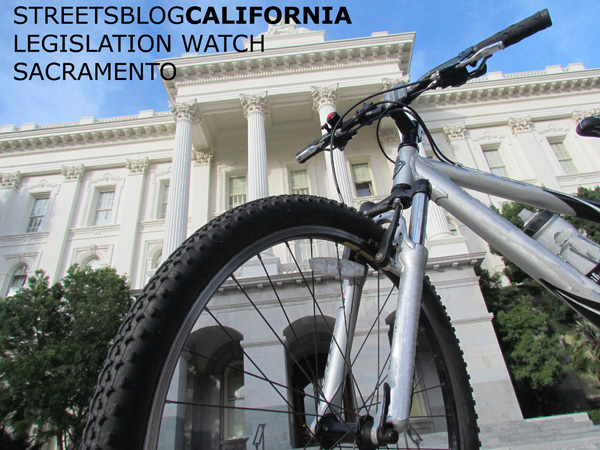Last year, Governor Brown called a “Special Session” to prod the California legislature to find solutions to what seemed an intractable problem: how to fund transportation needs in the state. Some bills were introduced, some hearings were held, but the biggest result of all the ballyhoo is a confirmation that the problem is, indeed, intractable.
Pavement condition is terrible in many places, and growing worse, in part because funding sources encourage building new roads and highways over maintaining what is already built. Traffic congestion and inadequate transit service waste time and money. Existing funding sources are not enough to pay for the backlog of deferred maintenance, let alone new projects on state priority lists. The gas tax is shrinking. Cities and counties have voted on or are considering local sales tax measures to raise money to “fix” transportation.
Some legislators insist that there is enough money being raised, but that it is being allocated inefficiently. Others disagree. Advocates say that spending priorities need to shift away from business as usual, while business as usual proponents argue there is not enough money to fund everything.
The Special Session has, so far, produced a few bills that have gone nowhere, and not much else. Assembly Transportation Committee Chair Jim Frazier has focused his energies freight movement, but nothing was produced by his committee. Senate Transportation Committee Chair Jim Beall (D-San Jose) came up with a solution that would raise gas taxes but faced stiff Republican opposition to the idea. His bill, SBX1-1, stalled in committee last fall.
Meanwhile the Governor released a proposed budget that, among many things, sought to create a new, undefined "Low Carbon Roads" program rather than support or increase funding for the Active Transportation Program. In May, he will issue a revision of his proposal, and one way or the other the legislature will have to grapple with his suggestions.
By law, the legislature must complete the budget by the end of June, and all legislative activity must be wrapped up by the end of August, including the Special Session. But there has been a long lull in the action.
Until last week, when Senator Beall amended his transportation funding bill. It seems to include a little bit for everyone to dislike, which means there's at least a little bit for everyone to like, which is one way to find consensus. For example, the bill includes increased funding for the Active Transportation Program, but it comes with a trade-off on Complete Streets language.
Whether his approach will garner the bill the support it needs remains to be seen. It has yet to be scheduled for a committee hearing. After the jump we discuss some of the bill's highlights.
Among its provisions, SBX1-1 from Senator Jim Beall would:
- Create an Active Transportation Program within Caltrans, with an annual budget of $100 million from the Greenhouse Gas Reduction Fund (GGRF). It also includes a requirement that Caltrans update its Highway Design Manual to incorporate the “complete streets” design concept by January 1, 2017. However, it eliminates previous language that would have required any capital improvement project funded by the state to include “new bicycle and pedestrian safety, access, and mobility improvements.”
- Create a “Road Maintenance and Rehabilitation” program to be funded by:
- a 12-cents-a-gallon increase in the gas tax
- a 10-cents-a-gallon increase in the diesel tax
- a $35 increase in vehicle registration fees
- a $100 vehicle registration fee for electric vehicles
- a new $35 road access charge
- repayment of outstanding loans from transportation funds to General Fund
- Five percent of the funds so raised would be distributed to counties that approve a new transactions and use tax (unspecified), with the remainder split between state highway maintenance/operations and cities and counties per formula
- Eliminate the annual gas tax rate adjustment, reinstate the gas excise tax to its 2010 rate and tie it to inflation, and adjust the rate regularly as fuel efficiency increases.
- Require the California Transportation Commission to adopt performance criteria related to highway performance goals, greenhouse gas emissions, social equity impacts, and public health impacts.
- Increase the sales tax on diesel to 5.75 percent (from 1.75 percent) to be used for transit capital and “certain transit services,” and substitute GGRF money for some tax money in the Public Transportation Account.
- Raise the GGRF appropriation to Transit and Intercity Rail Capital from 10 percent to 20 percent, and to Low Carbon Transit Operations from 5 percent to 10 percent.
The bill would also move the California Transportation Commission out from under the jurisdiction of the California State Transportation Agency, an idea that has been the subject of several recent bills that went nowhere, the most recent being SBX-12 from Senator Sharon Runner (R-Antelope Valley), which has languished with all the other special session bills since the fall.
Another provision that needs more study: the bill would exempt certain transportation projects from CEQA.
Streetsblog will keep studying the bill and keep you updated on its progress.
Email tips, alerts, press releases, ideas, etc. to melanie@streetsblog.org.
For social media coverage focused on statewide issues, follow Streetsblog California @streetsblogcal on Twitter, or like our Facebook page here.






